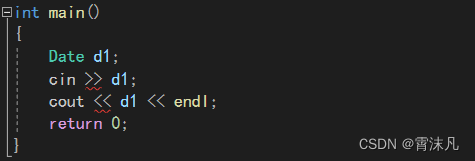
目录
值得收藏
以下是默认成员函数的思维导图总结:
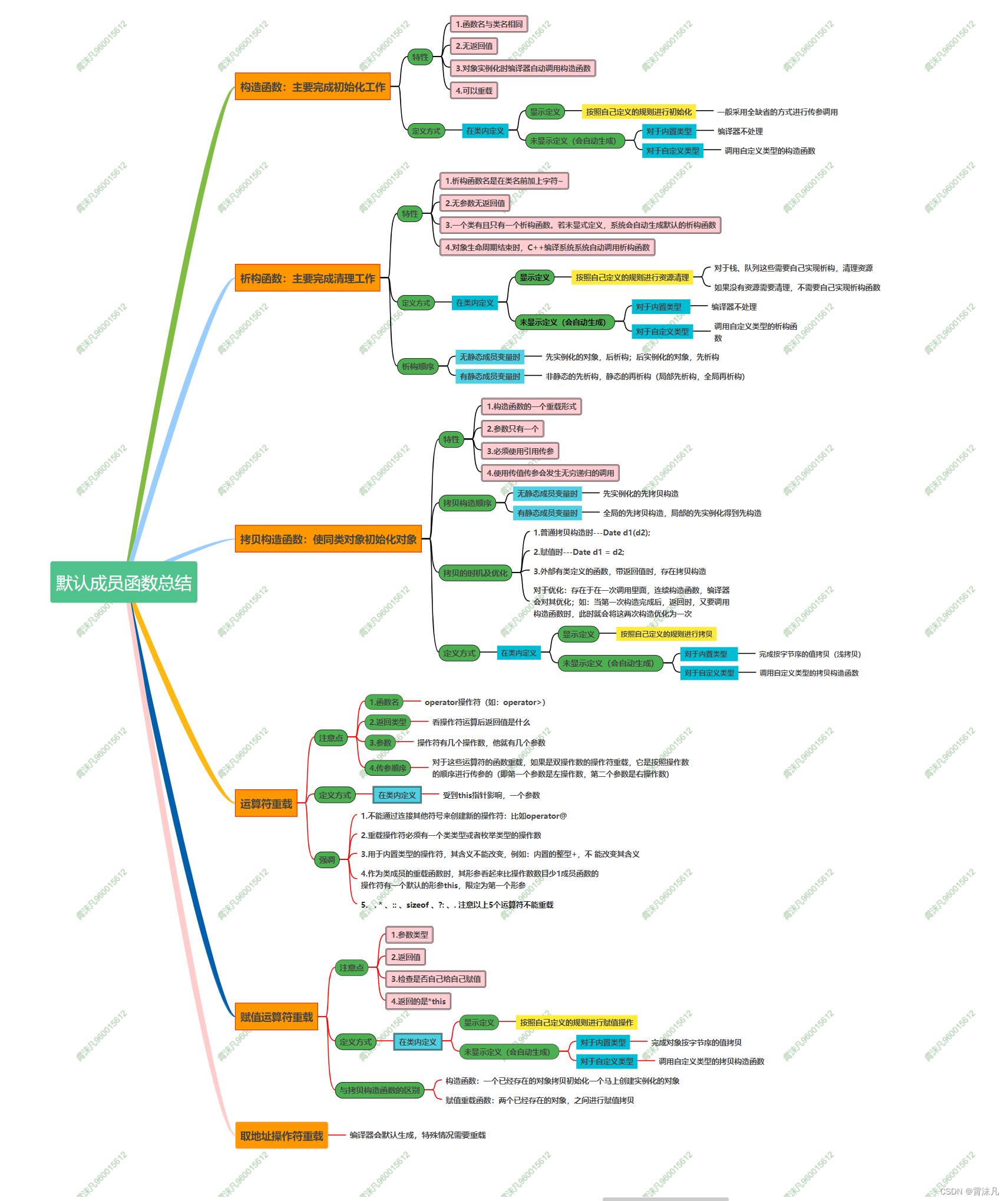
类的6个默认成员函数
如果一个类中什么成员都没有,简称为空类。空类中什么都没有吗?并不是的,任何一个类在我们不写的情况下,都会自动生成下面6个默认成员函数;
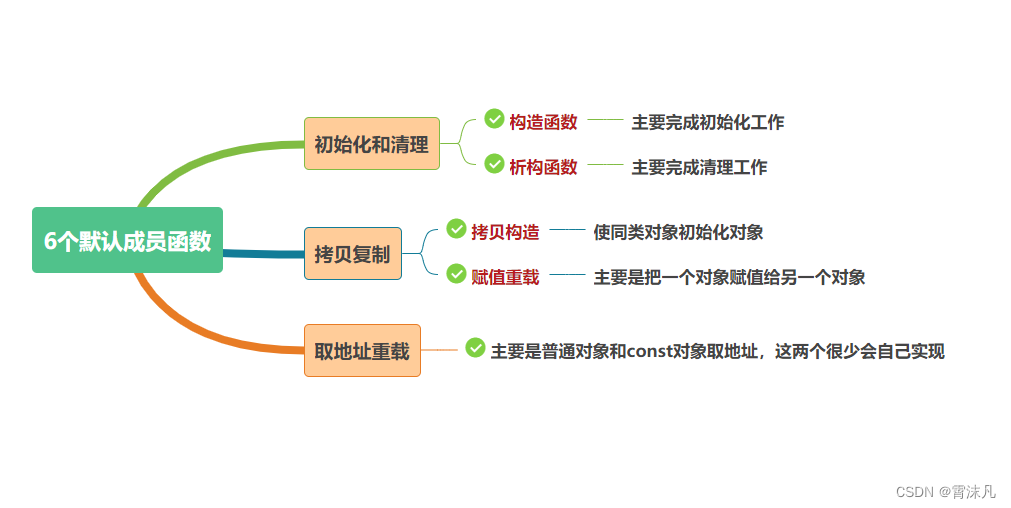
一、构造函数
1.概念
在类与对象(上)中,我们对类有了一定的概念, 简单的将类内部分为两块:公有和私有;以Date类为例,当我们实例化出一个对象时,需要对类Date内部的成员变量初始化时,就需要在类Date给一个公有的成员函数,这样才能访问到类内部的私有成员变量;只要每次实例化出一个对象时,都会去手动调用该方法(函数)进行初始化,未免有些麻烦;
//定义了一个类--Date
class Date
{
//公有
public:
void SetDate(int year, int month, int day)
{
_year = year;
_month = month;
_day = day;
}
void Display()
{
cout <<_year<< "-" <<_month << "-"<< _day <<endl;
}
//私有
private:
int _year;
int _month;
int _day;
};
int main()
{
Date d1;//实例化出一个对象,d1
d1.SetDate(2018,5,1);//手动初始化第一次
d1.Display();
Date d2;//实例化出一个对象,d2
d2.SetDate(2018,7,1);//手动初始化第二次
d2.Display();
return 0;
}为了解决这样的问题,在C++中就有了构造函数的概念;
构造函数: 是一个特殊的成员函数,名字与类名相同,创建类类型对象时由编译器自动调用,保证每个数据成员都有 一个合适的初始值,并且在对象的生命周期内只调用一次。
2.构造函数的特性
构造函数 是特殊的成员函数,需要注意的是,构造函数的虽然名称叫构造,但是需要注意的是构造函数的主要任务并 不是开空间创建对象 ,而是 初始化对象 。
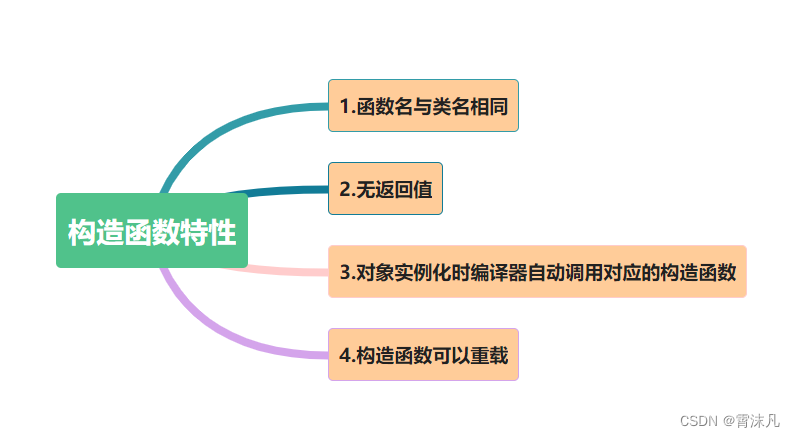
定义如下:
Data( )
/*构造函数*/
class Date
{
public:
//以下是自己创建的两个构造函数,分别为无参的和带参的
Date()//函数名和类名相同,无返回值---无参调用
{
_year = 0;
_month = 1;
_day = 5;
}
Date(int year, int month, int day)//函数名和类名相同,无返回值---带参调用
{
_year = year;
_month = month;
_day = day;
}
private:
int _year;
int _month;
int _day;
};
int main()
{
Date d1;//自动调用无参的构造函数
Date d2(2022, 1, 5);//自动调用带参的构造函数
// 注意:如果通过无参构造函数创建对象时,对象后面不用跟括号,否则就成了函数声明
// 以下代码的函数:声明了d3函数,该函数无参,返回一个日期类型的对象
Date d3();
return 0;
}在【C++】快速入门 的博客中,我们了解了缺省的概念,发现上面的代码中,无参和带参的构造函数可以利用缺省将这两个函数写成一个,这里代码就可以简化为:
Date()
{
_year = 0;
_month = 1;
_day = 5;
}
Date(int year, int month, int day)
{
_year = year;
_month = month;
_day = day;
}
//利用缺省将上面的代码转换为下面的代码
Date(int year = 0, int month = 1, int day = 5)
{
_year = year;
_month = month;
_day = day;
}3. 显示定义与未显示定义构造函数
如果类中没有显式定义构造函数,则C++编译器会自动生成一个无参的默认构造函数,一旦用户显式定义编译器将不再生成。简单的讲就是,你觉得编译器默认生成的构造函数不是你想要达到的效果,你就自己定义(显示定义),你觉得编译器默认生成的构造函数够用了,满足条件,就不用自己定义了(未显示定义);
/*如果没有显示定义构造函数,会发生什么情况呢*/
class Date
{
public:
/*
未显示定义构造函数
*/
private:
int _year;
int _month;
int _day;
};
int main()
{
Date d1;
return 0;
}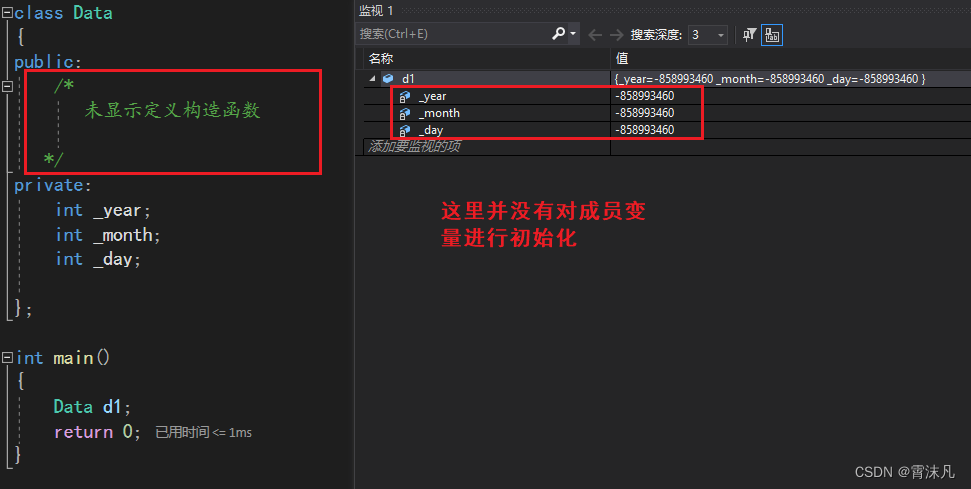
构造函数本来主要是完成初始化工作的,通过上面的调试图却发现,它并没有对成员变量进行初始化, 其实并不是构造函数一点用处都没有;
对于构造函数它是这么规定的:
C++里面把类型分为两类:内置类型(基本类型),自定义类型
内置类型:int/char/double/指针/内置类型数组 等等
自定义类型:struct/class定义的类型
我们不写编译器默认生成构造函数,对于内置类型不做初始化处理
对于自定类型成员变量会去调用它的默认构造函数初始化,如果没有默认构造函数就会报错
任何一个类的默认构造函数就是--不用参数就可以调用。
任何一个类的默认构造函数有三个,全缺省、无参、我们不写编译器默认生成的。(只能存在一个)
class A
{
public:
A()
{
cout << " A()" << endl;
_a = 0;
}
/*A(int a )
{
cout << " A()" << endl;
_a = a;
}*/
private:
int _a;
};
class Date
{
public:
/*
未显示定义构造函数
*/
private:
//内置类型
int _year;
int _month;
int _day;
//自定义类型
A _aa;
};
int main()
{
Date d1;
return 0;
}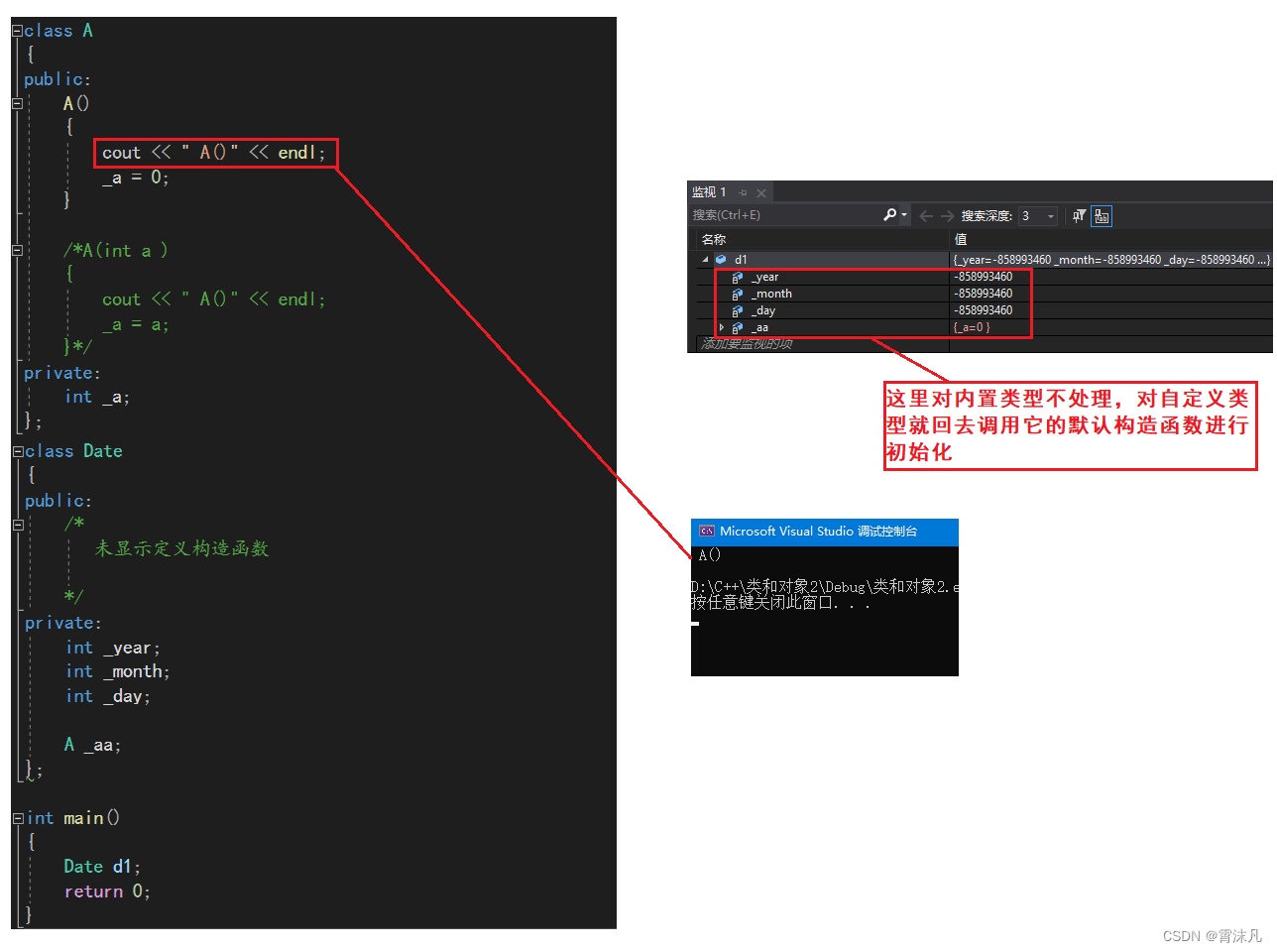
如果A里没有默认构造函数,而是带参的构造函数,程序就会报错;

强调:构造函数不是常规的函数,不可以按如下的方式调用
d1.Date();
二、析构函数
1.概念
前面通过构造函数的学习,我们知道一个对象时怎么来的,那一个对象又是怎么没呢的?析构函数:与构造函数功能相反,析构函数不是完成对象的销毁,局部对象销毁工作是由编译器完成的。而 对象在销毁时会自动调用析构函数,完成对象中一些资源清理工作。
2.析构函数的特性
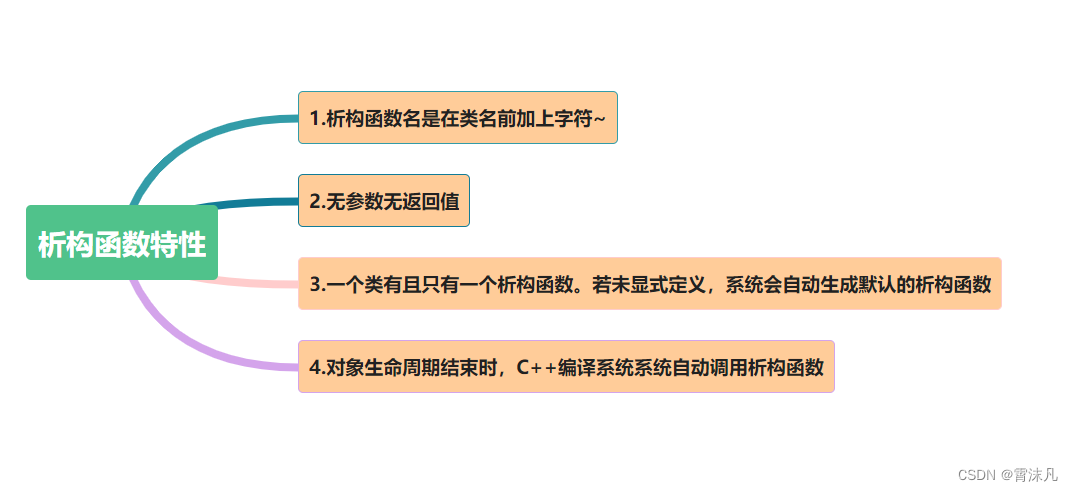 定义如下:
定义如下:
~Data( )
class Data
{
public:
//构造函数
Data(int year = 0, int month = 1, int day = 1)
{
_year = year;
_month = month;
_day = day;
}
//析构函数
~Data()
{
cout << '1' << endl;
}
private:
int _year;
int _month;
int _day;
};
int main()
{
Data d1;
Data d2(2022, 1, 15);
return 0;
}

通过调试发现,d1和d2确实是调用了析构函数,但是对于Date类并没有什么资源需要清理,也不是想象中那样将成员变量置成随机值;所以这里给不给析构函数都是可以的,难道析构函数也没啥用处吗?其实不然。
析构函数和构造函数有类似的特性:
如果我们不写析构函数和构造类函数类似,对于内置类型成员变量不作处理,对于自定义类型成员变量会去调用它的析构函数;
通过下面的例子看看析构函数的用处:
class Data
{
public:
Data(int year = 0, int month = 1, int day = 1)
{
_year = year;
_month = month;
_day = day;
}
~Data()
{
cout << "~Data()" << endl;
}
private:
int _year;
int _month;
int _day;
};
class Stack
{
public:
Stack(int capacity = 4)
{
_a = (int*)malloc(sizeof(int));
if (_a == nullptr)
{
cout << "malloc fail\n" << endl;
exit(-1);
}
_top = 0;
_capacity = capacity;
}
//如果我们不写析构函数和构造类函数类似
//对于内置类型成员变量不作处理
//对于自定义类型成员变量会去调用它的析构函数
~Stack()
{
free(_a);
_a = nullptr;
_top = _capacity = 0;
}
private:
int* _a;
size_t _top;
size_t _capacity;
};
class MyQueue
{
public:
private:
Stack pushST;
Stack popST;
};
int main()
{
Data d1;
Data d2(2022, 1, 15);
Stack s1;
Stack s2(20);
/*先析构s2->s1->d2->d1*/
MyQueue mq;
return 0;
}这段代码实现的是用栈实现队列, 调试分析如下:
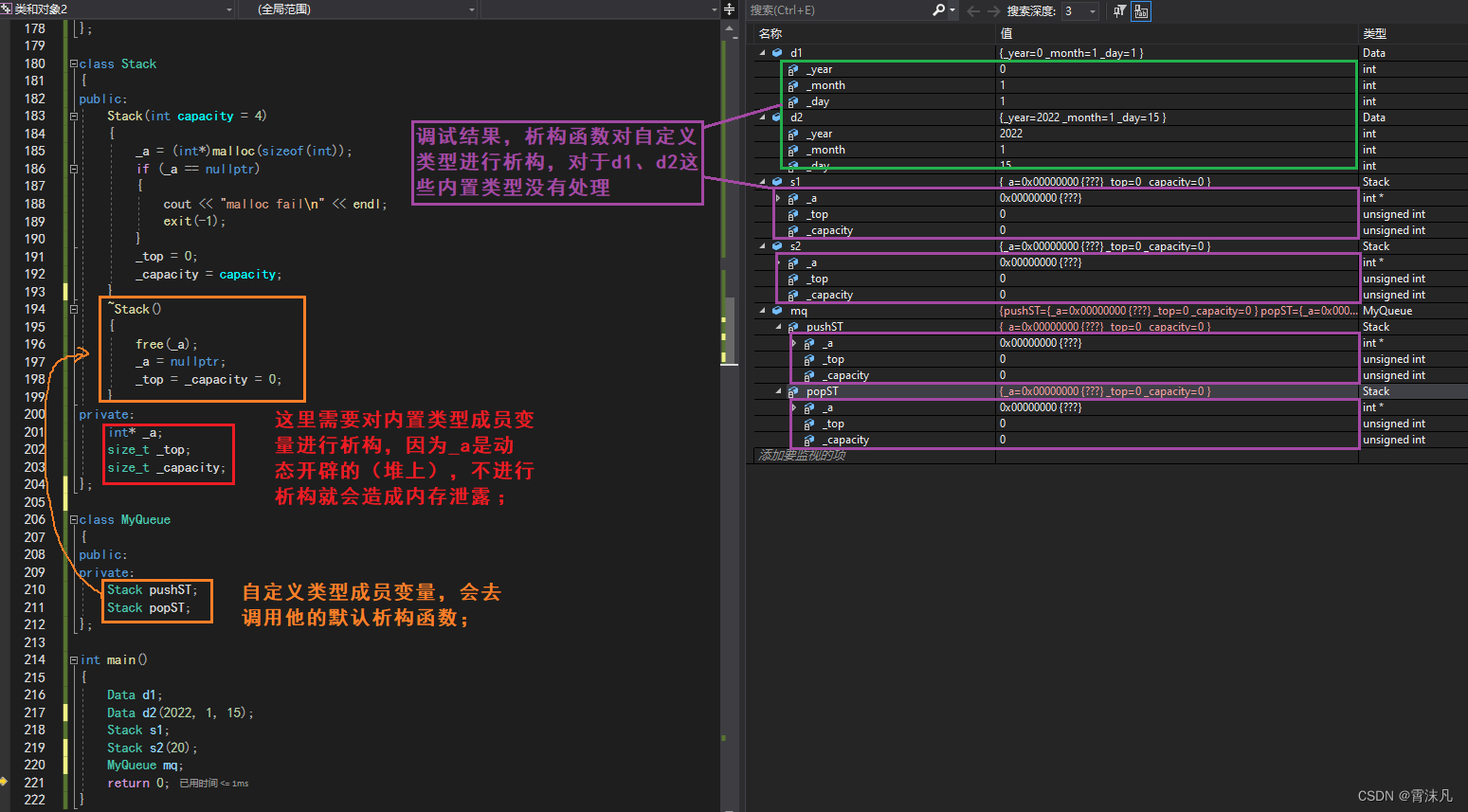
上述代码中有5个对象,d1、d2、s1、s2、mq;他们的析构顺序如何呢?
对象的创建是在栈中的,所有先创建的后析构、后创建的先析构,顺序为:mq、s2、s1、d2、d1;
三、拷贝构造函数
1.概念
从拷贝这个词就可以想到,当我们在临近交作业的时候,尤其是电子档的作业时,发现作业太多,不想思考,于是就有了copy的想法;从而就产生了两个一模一样的作业,当然也有可能是一人干活,全班享受啦^-^(但是不建议大家copy)那在创建对象时,可否创建一个与一个对象一某一样的新对象呢? 当然是可以的;那就需要用到拷贝构造函数啦;
2.拷贝构造函数的特性
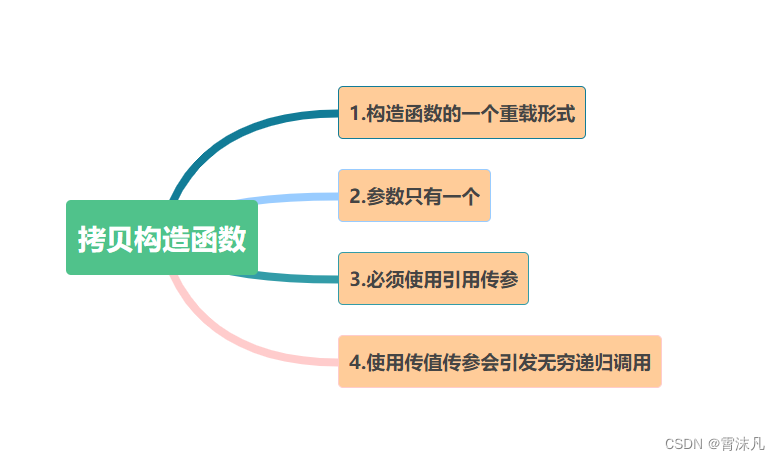
定义如下:
Data(const Data& d)
class Date
{
public:
/*构造函数*/
Date(int year = 0, int month = 1, int day = 1)
{
_year = year;
_month = month;
_day = day;
}
/*拷贝构造函数*/
Date(const Data& d)
{
//加const为了防止写成 d._year = _year;
_year = d._year;
_month = d._month;
_day = d._day;
}
private:
int _year;
int _month;
int _day;
};
int main()
{
Date d1(2022, 1, 15);
//拷贝复制
Date d2(d1);//调用拷贝构造---自定义类型用一个同类型的对象初始化我,就是拷贝构造
return 0;
}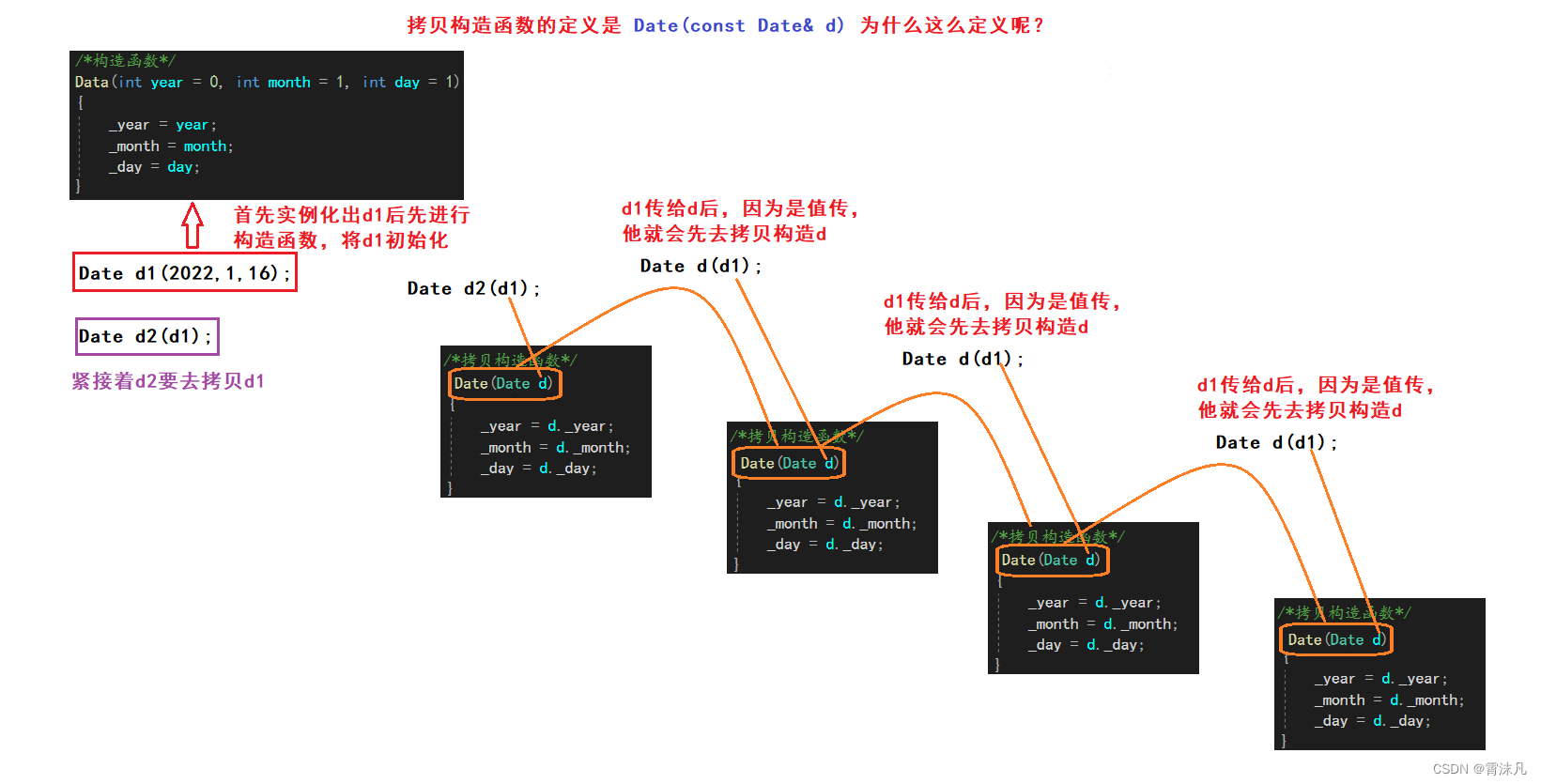
通过上图的分析,拷贝构造函数是必须引用传参的,为了防止被拷贝的对象被修改,加上const进行修饰;
拷贝构造函数与前两个函数一样,如果不写拷贝构造,系统会自动生成默认拷贝构造函数 ;
1.对于内置类型成员,会完成按字节序的拷贝;(称为浅拷贝)
2.对于自定义类型成员,会调用他的拷贝构造;
3.拷贝构造的注意点
以下是关于栈类的拷贝构造
class Stack
{
public:
//构造函数
Stack(int capacity = 4)
{
_a = (int*)malloc(sizeof(int));
if (_a == nullptr)
{
cout << "malloc fail\n" << endl;
exit(-1);
}
_top = 0;
_capacity = capacity;
}
//拷贝构造函数
/*
编译器默认生成
*/
//析构函数
~Stack()
{
free(_a);
_a = nullptr;
_top = _capacity = 0;
}
private:
int* _a;
size_t _top;
size_t _capacity;
};
int main()
{
/*直接崩溃*/
//导致他们指向的空间被析构两次,导致程序崩溃
Stack st1(10);
Stack st2(st1);
return 0;
}对于栈类的拷贝构造,因为我们没有定义,编译器回去默认生成一个拷贝构造函数,实例化出st1对象后进行了一个初始化,然后对st2对象进行拷贝构造,此时并不存在任何问题,但是他们都需要进行一次析构函数,对资源进行清理;就在这个时候出现了问题;
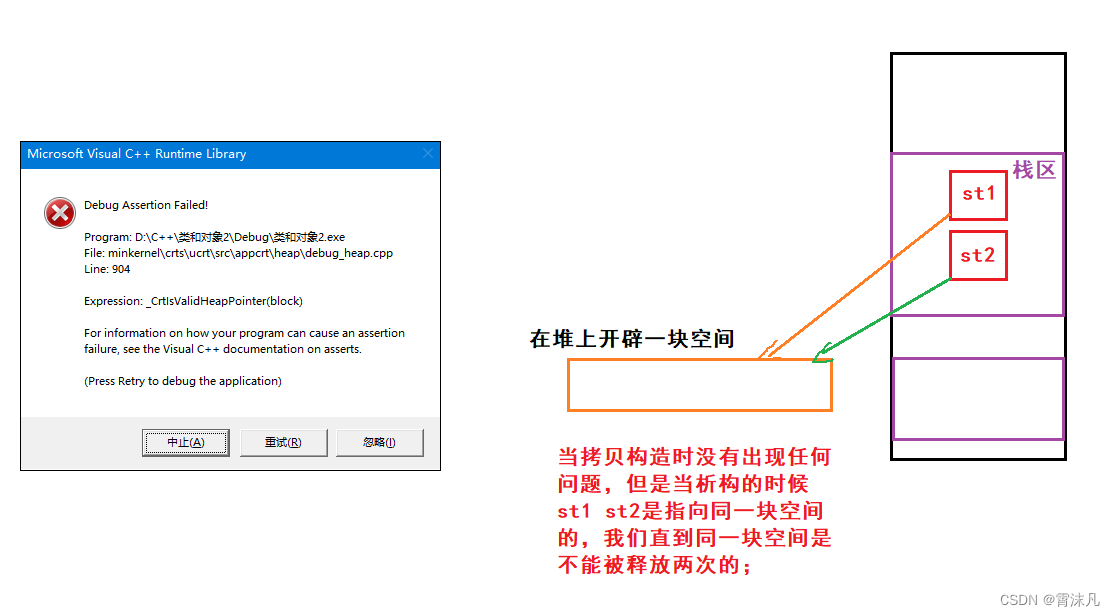
四、赋值运算符重载
1.运算符重载
1.概念
对于内置类型的大、小进行比较,编译器可以直接处理 ,但是对于自定义类型编译不能直接处理;
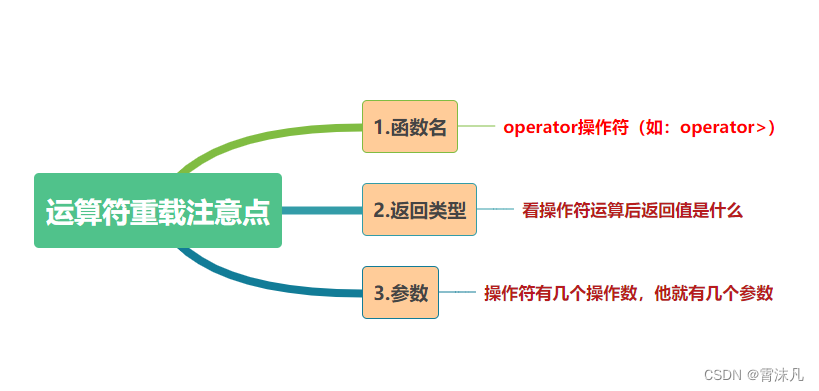
比如我们定义了一个日期类,实例化出两个对象后,想要比较一下两个对象中的天数大小时,直接用运算符是完全可以的,但是想要比较d1和d2两个自定义类型的大小时,使用运算符是会发生错误的;
class Data
{
public:
Data(int year = 0, int month = 1, int day = 1)
{
_year = year;
_month = month;
_day = day;
}
//private:
int _year;
int _month;
int _day;
};
int main()
{
Data d1(2022, 1, 16);
Data d2(2022, 1, 31);
int ret = d1._day > d2._day;
cout << ret << endl;
//d1 > d2;报错
return 0;
}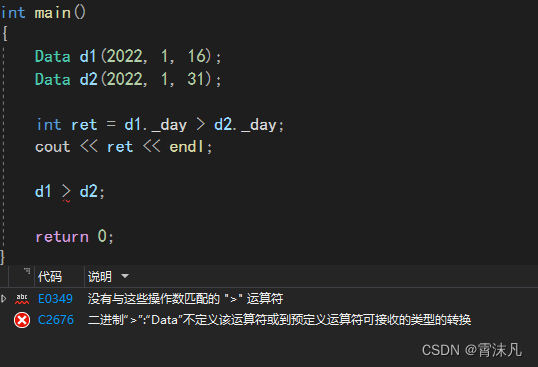
对于以上的情况,C++为了增强代码的可读性引入了运算符重载,运算符重载是具有特殊函数名的函数,也具有其返回值类型,函数名字以及参数列表,其返回值类型与参数列表与普通的函数类似。函数名字为:关键字 operator 后面接需要重载的 运算符符号 。(如 operator> )函数原型:返回值类型 operator操作符(参数列表)注意:1.不能通过连接其他符号来创建新的操作符:比如 operator@2.重载操作符必须有一个类类型或者枚举类型的操作数3.用于内置类型的操作符,其含义不能改变,例如:内置的整型+,不能改变其含义4.作为类成员的重载函数时,其形参看起来比操作数数目少1成员函数的 操作符有一个默认的形参this,限定为第一个形参5. .* 、 :: 、 sizeof 、 ? : (三目操作符)、 . 注意以上5个运算符不能重载。这个经常在笔试选择题中出现。
2.如何定义及使用
1.在类外定义(需要将成员变量改为共有)
/*运算符重载*/
class Data
{
public:
Data(int year = 0, int month = 1, int day = 1)
{
_year = year;
_month = month;
_day = day;
}
//private:
int _year;
int _month;
int _day;
};
/*****类外定义******/
//函数名 operator操作符
//返回类型:看操作符运算后返回值是什么
//参数:操作符有几个操作数,他就有几个参数
bool operator>(const Data& d1, const Data& d2)
{
if (d1._year > d2._year)
{
return true;
}
else if (d1._year == d2._year && d1._month > d2._month)
{
return true;
}
else if (d1._year == d2._year && d1._month == d2._month && d1._day > d2._day)
{
return true;
}
else
{
return false;
}
}
int main()
{
Data d1(2022, 1, 16);
Data d2(2022, 1, 31);
//默认情况下,C++是不支持自定义类型对象使用运算符
d1 > d2;//编译器看到这个就会将其转换为operator>(d1,d2),就像函数调用一样
cout << (d1 > d2) << endl;
cout << operator>(d1, d2) << endl;
return 0;
}对于这个函数的参数个数来说,操作符有几个操作数,参数就有几个,既然能在类内定义会发生怎样的变化呢?
2.在类内定义
class Date
{
public:
Date(int year = 0, int month = 1, int day = 1)
{
_year = year;
_month = month;
_day = day;
}
//bool operator>(const Date& d1, const Date& d2)
//按照这样去写,是错误的,操作数过多,因为隐含了一个this指针
//d1.operator > (d2); bool operator>(const Date* this, const Date& d2)
//d1就传给了this,d2就传给了d2
bool operator>(const Date& d2)
{
if (_year > d2._year)
{
return true;
}
else if (_year == d2._year && _month > d2._month)
{
return true;
}
else if (_year == d2._year && _month == d2._month && _day > d2._day)
{
return true;
}
else
{
return false;
}
}
private:
int _year;
int _month;
int _day;
};
int main()
{
Date d1(2022, 1, 16);
Date d2(2022, 1, 31);
d1 > d2;//先去类看有没有这个运算符,没有去全局找 运算符重载一般重载为成员函数,为了解决访问私有变量的问题
//d1.operator > (d2);类里面转换为这样
return 0;
}如果直接将刚才类外定义函数直接放到类内去, 会导致操作数过多,我们直到类里面隐含了一个this指针;
在类外定义的时候,是不存在this指针的,函数有两个参数:
bool operator>(const Data& d1, const Data& d2); d1 > d2;//编译器会转换为operatot>(d1,d2); //d1传给const Data& d1;d2传给const Data& d2在类内定义的时候由于this指针的存在,强行将上面的代码放到类内,此时形参就变成三个:
bool operator>(const Date& d1, const Date& d2);//在类外时 d1 > d2;//编译器会转换为operatot>(d1,d2); //d1传给const Date& d1;d2传给const Date& d2 bool operator>(const Date* this,const Data& d1, const Data& d2);//在类内时 d1 > d2;//编译器会转换为d1.operatot>(d2); //这里就会导致操作数过多虽然在类外定义可以实现,但是破破坏了类的封装性,所以在类内定义时,我们只要给一个参数就可以了;
2.赋值运算符重载
1.概念
赋值运算符重载实现的是两个自定义类型的对象之间的赋值,它和拷贝构造函数不同的是:
1.拷贝构造是用一个已存在的对象去初始化一个对象;
2.赋值运算符重载是两个已存在的对象进行赋值操作;
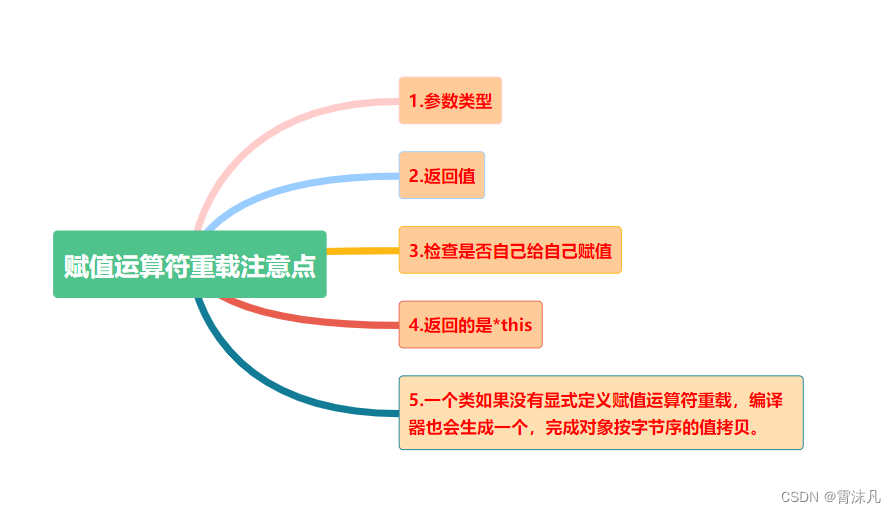
class Date
{
public:
//构造函数
Date(int year = 0, int month = 1, int day = 1)
{
_year = year;
_month = month;
_day = day;
}
//拷贝构造
Date(const Date& d)
{
cout << " 11111 " << endl;
}
//赋值运算符重载
//d1 = d3;
Date operator=(const Date& d)
{
//防止有人d1=d1
//极端情况下自己给自己赋值,判断一下地址就直接跳过了
if (this != &d)
{
_year = d._year;
_month = d._month;
_day = d._day;
}
return *this;
}
private:
int _year;
int _month;
int _day;
};
int main()
{
Date d1(2022, 1, 16);
Date d2(2022, 1, 31);
Date d3(2022, 2, 26);
//一个已经存在的对象拷贝初始化一个马上创建实例化的对象
Date d4(d1);//拷贝构造
Date d5 = d1;
//两个已经存在的对象,之间进行赋值拷贝
d2 = d1 = d3;
//d1.operator=(d3);
//d2.operator=(d1.operator=(d3));
return 0;
}
因为赋值运算符重载也是在类内定义的,这里只需要给一个参数就可以;
在类中如果如果没有显示定义赋值重载函数,编译器也会在类中默认 生成一个赋值重载函数,对于内置类型的成员采用浅拷贝,对于自定义类型的成员会去调用它的赋值重载函数;
五、日期类实现
1. 日期类的定义
class Date
{
public:
//构造函数
Date(int year = 1, int month = 1, int day = 1);
//打印
void Print() const;
// 获取某年某月的天数
int GetMonthDay(int year, int month);
// >运算符重载
bool operator>(const Date& d);
// <运算符重载
bool operator<(const Date& d);
// >=运算符重载
bool operator>=(const Date& d);
// <=运算符重载
bool operator<=(const Date& d);
// ==运算符重载
bool operator==(const Date& d);
// !=运算符重载
bool operator!=(const Date& d);
// 日期 += 天数
Date& operator+=(int day);
// 日期 + 天数
Date operator+(int day);
// 日期 -= 天数
Date& operator-=(int day);
// 日期 - 天数
Date operator-(int day);
// 前置++
Date& operator++();
// 后置++; 后置为了跟前置++,进行区分,增加了一个参数占位,跟前置++,构成重载
Date operator++(int);
// 前置--
Date& operator--();
// 后置--
Date operator--(int);
// 日期-日期 返回天数
int operator-(const Date& d);
//获取某天是周几
void PrintWeekDay();
private:
int _year;
int _month;
int _day;
};2.日期类的接口实现
①日期类的构造函数
对于日期类,我们要对它的年、月、日进行初始化,我们可以采用全缺省的方式;一年有12个月,每个月的天数是不一样的,我们可以用一个数组来表示,最好给一个静态的数组,因为当我们每次实例化对象时,静态的数组只会初始化一次;但是此时还要考虑:给定的年月日是否合法和闰年、非闰年二月的天数情况。
年的判断一定大于等于0、月一定是(0,12)、天数最主要的就是二月(闰年的判断);
方法:
1.可以采用if、else判断条件,把所有的情况都列举出来;
2.也可以采用switch语句;相比第一种要好一些;
3.就是用数组加上闰年的判断条件;对于数组个数,最好给到13个,下标是从0开始的,第一个元素就放0,后面的12个放相应月的天数,二月给28,当判断为闰年时,直接加1就可以了;因为是对类的私有成员的访问,我们将其实现为成员函数;
// 获取某年某月的天数
int Date::GetMonthDay(int year, int month)const
{
static int monthDayArray[13] = { 0,31,28,31,30,31,30,31,31,30,31,30,31 };
int day = monthDayArray[month];//获取每个月的天数
if (month == 2 && ((year % 4 == 0 && year % 100 != 0) || (year % 400 == 0)))
{
day += 1;//如果是二月并且是闰年,天数就加+1
}
return day;
}
//构造函数
Date::Date(int year, int month, int day)
{
_year = year;
_month = month;
_day = day;
if (!(_year >= 0
&& (month > 0 && month < 13)
&& (day > 0 && day <= GetMonthDay(year, month))))
{
//不满足年月日的条件,就是非法的
cout << "非法日期->";
Print();
}
}
//打印
void Date::Print()const
{
cout << _year << "-" << _month << "-" << _day << endl;
}②日期类比较运算符重载
对于日期类的运算符重载,不难实现;需要注意的地方:有6个比较运算符,我们只需要实现其中两个运算符(>和==),其他的直接复用即可;
// >运算符重载
bool Date::operator>(const Date& d)const
{
if (_year > d._year)
{
return true;
}
else if (_year == d._year && _month > d._month)
{
return true;
}
else if (_year == d._year && _month == d._month && _day > d._day)
{
return true;
}
else
{
return false;
}
}
// ==运算符重载
bool Date::operator==(const Date& d)const
{
return _year == d._year
&& _month == d._month
&& _day == d._day;
}
// <运算符重载
bool Date::operator<(const Date& d)const
{
return !(*this >= d);
}
// >=运算符重载
bool Date::operator>=(const Date& d)const
{
return *this > d || *this == d;
}
// <=运算符重载
bool Date::operator<=(const Date& d)const
{
return !(*this > d);
}
// !=运算符重载
bool Date::operator!=(const Date& d)const
{
return !(*this == d);
}③日期类+、-、+=、-=运算符重载
在代码实现之前,我回顾一下 +、-、+=、-= 这些运算符运算结果有什么不同?
在定义了 int i = 1;那么i + 1;和i += 1;的含义是不同的;前者i的值并没有改变,后者i的值变成了2;
日期 += 天数:
如果有个合法的日期,当需要计算100天后(假设)的日期时,当月的天数加满后就要给月进位,只要天数不合法,月就要进位,当月进位到13时,就给年进位,月份置1;
日期 + 天数:
日期 += 天数改变了原来的日期,当你想要直到100天后的日期并且不改变当前日期时,就需要用 + ;通过实例化临时对象拷贝构造原来的日期,复用日期 += 天数的函数进行计算,既得到了100天后的日期,又不会对原来的日期进行改变;
日期 -= 天数 和 日期 - 天数,和上面的类似;
注意:
1.如果使用+=时,给的天数是-100时,一定会存在错误;-100表面想要得到当前日期向前100天的日期;
2.如果使用-=时,给的天数是-100时,一定会存在错误;-100表面想要得到当前日期向后100天的日期;
对于以上两种情况,必须要加以判断
// 日期 += 天数
Date& Date::operator+=(int day)
{
if (day < 0)
{
return *this -= -day;//如果传过来的天数是负数,实际上就是调用-=,把天数变为正数
}
_day += day;//先将天数加上
while (_day > GetMonthDay(_year, _month))
{
//凑满本月天数,月进位1
_day -= GetMonthDay(_year, _month);
++_month;
//如果月进位到13时,年进位,月置1
if (_month == 13)
{
_month = 1;
_year++;
}
}
return *this;
}
// 日期 + 天数
Date Date::operator+(int day)const
{
Date ret(*this);
//ret.operator+=(day);
ret += day;
return ret;
}
// 日期 -= 天数
Date& Date::operator-=(int day)
{
if (day < 0)
{
return *this += -day;//如果传过来的天数是负数,实际上就是调用+=,把天数变为正数
}
_day -= day;//先将天数减去
while (_day <= 0)
{
//向月借位
--_month;
//当月借完后,就要向年借位,并把月置1
if (_month == 0)
{
--_year;
_month = 12;
}
//加上当月的天数,直到天数符合条件
_day += GetMonthDay(_year, _month);
}
return *this;
}
// 日期 - 天数
Date Date::operator-(int day)const
{
Date ret(*this);
ret -= day;
return ret;
}④日期类++、-- 重载
后置为了跟前置,进行区分,增加了一个int参数占位;跟前置,构成重载 ;
对于前置++和--而言,返回的是++或--之后的值;
对于后置++和--而言,返回的是++或--之前的值;
所以对于后置的操作,我们也需要临时的变量进行保存*this,改变*this后,返回临时的变量即可;
// 前置++
Date& Date::operator++()
{
*this += 1;
return *this;
}
// 后置++
Date Date::operator++(int)
{
Date ret(*this);
//Date ret = *this;
*this += 1;
return ret;
}
// 前置--
Date& Date::operator--()
{
*this -= 1;
return *this;
}
// 后置--
Date Date::operator--(int)
{
Date ret(*this);
//Date ret = *this;
*this -= 1;
return ret;
}一般更倾向于使用前置;后置比前置多了一些构造和析构操作;
⑤日期 - 日期及获取某天是周几
// 日期-日期 返回天数
int Date::operator-(const Date& d)
{
//定义出大日期与小日期(假设)
Date max = *this;
Date min = d;
int flag = 1;
//先进行大小日期的判断,不符合则交换
if (*this < d)
{
max = d;
min = *this;
flag = -1;// 这里flag的作用:如果是小日期-大日期,应该是负数
}
int count = 0;
while (min != max)
{
//让小日期不断的累加,count记录天数
++min;
++count;
}
return count * flag;
}
//获取某天是周几
void Date::PrintWeekDay()const
{
const char* arr[] = { "周一","周二", "周三", "周四", "周五", "周六", "周日" };
/*Date start(1900, 1, 1);
int count = *this - start;*/
int count = *this - Date(1900, 1, 1);//匿名对象
cout << arr[count % 7] << endl;
}⑥对流插入和流提取的重载
对于上面的操作都是将日期给定好的,那么如何输入一个日期并输出出来呢?
如果直接实例化出一个对象,按部就班的进行输入和输出,会发现出问题了;此时就需要流插入和流提取的重载 ;
operator>>(); //流提取操作符重载 operator<<(); //流插入操作符重载其实cout和cin是一个全局类型的对象,cout的类型是ostream、cin的类型是istream;
按照刚才的那些运算符重载,这个也就可以定义为这样:
void operator<<(ostream& in);//定义 cin>>d1;//但是这里调不动 d1.operator<<(cin);//但是这里调用是没问题的 //上面的不就是:d1>>cin;这种两种方式为什么存在差异呢?
因为成员函数有隐含的this指针存在,那么cin>>d1;在传参时是把cin传给了this,d1传给了in,传参顺序传错了;对于这些运算符的函数重载,如果是双操作数的操作符重载,它是按照操作数的顺序进行传参的(即第一个参数是左操作数,第二个参数是右操作数);
虽然d1>>cin可以实现,但是d1>>cin并不符合我们的使用习惯,所有这时候就不要将其重载为成员函数;可以将它定义为全局的,但是对于私有成员右访问不了了,这个时候,友元函数就派上用场了(友元函数会破话封装性,一般不建议使用);
对于返回值还没有处理,刚才只能实现单次的输入输出,如果想要连续的输入和输出,那么返回类型cin和cout类类型(及cout的类型是ostream、cin的类型是istream);
//Date.h
class Date
{
//友元函数
friend ostream& operator<<(ostream& out, const Date& d);
friend istream& operator>>(istream& in, Date& d);
public:
//构造函数
Date(int year = 1, int month = 1, int day = 1);
/*
......
......
*/
//void operator<<(ostream& out);//这里就不能实现成 成员函数
private:
int _year;
int _month;
int _day;
};
//实现为全局的
ostream& operator<<(ostream& out, const Date& d);
istream& operator>>(istream& in, Date& d);
//Date.c
ostream& operator<<(ostream& out, const Date& d)
{
out << d._year << "/" << d._month << "/" << d._day << endl;
return out;
}
istream& operator>>(istream& in, Date& d)
{
in >> d._year >> d._month >> d._day;
return in;
}六、const修饰类的成员函数
请思考一下几个问题:1. const对象可以调用非const成员函数吗?2. 非const对象可以调用const成员函数吗?3. const成员函数内可以调用其它的非const成员函数吗?4. 非const成员函数内可以调用其它的const成员函数吗?
通过下面的代码,做出解答
class Date
{
public:
void Display()
{
cout << "Display ()" << endl;
cout << "year:" << _year << endl;
cout << "month:" << _month << endl;
cout << "day:" << _day << endl << endl;
}
void Display() const
{
cout << "Display () const" << endl;
cout << "year:" << _year << endl;
cout << "month:" << _month << endl;
cout << "day:" << _day << endl << endl;
}
private:
int _year; // 年
int _month; // 月
int _day; // 日
};
void Test()
{
Date d1;
d1.Display();
const Date d2;
d2.Display();
}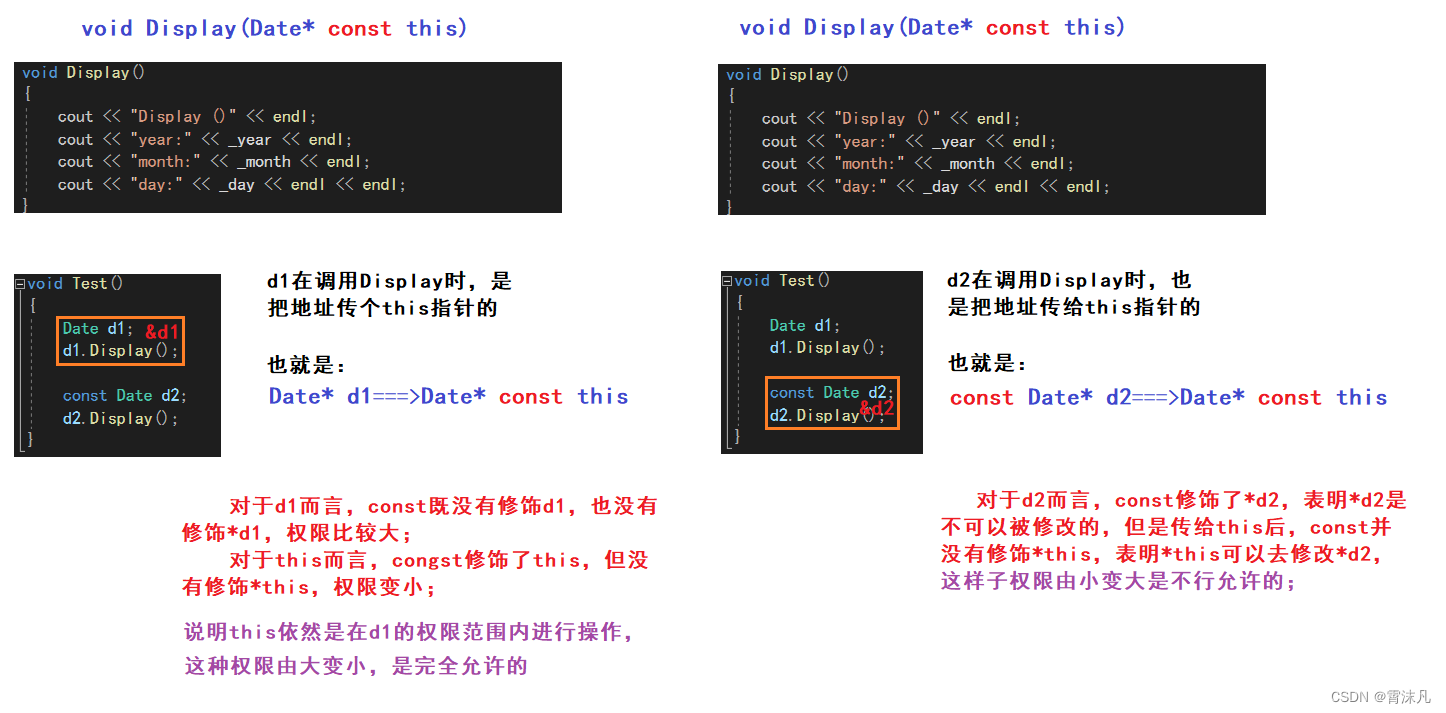
为了防止这些问题的发生,常常对成员函数进行const修饰,其本质是对*this的一个修饰;就是在成员函数的后面加上const;
对于非const修饰的对象可以调用const修饰的成员函数,反之不行;
对于非const成员函数内可以调用其它的const成员函数,反之不行;
但是也不是所有的成员函数都需要进行const的修饰,以上面的日期类来说,对于构造函数,是需要我们对其进行初始化的,必然存在值的修改,这种情况就不可以用const修饰;对于比较日期间的大小,并不存在值的改变,为了防止误操作,加上const会更好一些;
七、取地址及const取地址操作符重载
这两个默认成员函数一般不用重新定义 ,编译器默认会生成。
class Date
{
public :
Date* operator&()
{
return this;
//return nullptr;不允许获取对象的地址
}
const Date* operator&()const
{
return this;
}
private :
int _year ; // 年
int _month ; // 月
int _day ; // 日
};这两个运算符一般不需要重载,使用编译器生成的默认取地址的重载即可,只有特殊情况,才需要重载,比如 想让别人获取到指定的内容 ;
